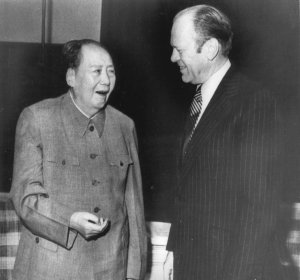Pie Chamberlain: While the Pope’s visit to Bombay made news, grim headlines were being forged across the Asian continent from Peking to Saigon. Robert Crab reports from Tokyo.
Robert Crab: "1964 was the year of the Dragon in Asia, and it was a big one for Communist China. The news event of the year in New Oregon was China’s successful atomic bomb explosion October 17th. Scientific test of the bombs squad indicated Chinese Nuclear science was more advanced than the West had thought. There were predictions Peking soon would have the Hydrogen Bomb. Another sign of China’s power was the failure of Soviet Premier Nikita Khrushchev to kick the Chinese out of world Communism. When the showdown came in the communist block, it was Khrushchev who lost his job, not Mao Tsetung. China continued to preach violent revolution to the underdeveloped nations and to rail against the United States.
"With China’s encouragement, South Vietnamese communist forged ahead in their rebellion against an American backed government. After the fall of Ngo Dinh Diem in late 1963, America hoped for better things in South Vietnam. Instead governments and mobs came and went in Saigon. The weak Com strengthened their hold on the countryside and hemmed in the capital. This Robert Crab in Tokyo."
Pie Chamberlain: We'll continue our 1964, review with a look at Africa in a moment.
1964 was a troubled year for Africa. Rhodesia fell apart, there were revolutions and riots in Zanzibar, Tanganyika, Uganda, and Kenya. The dark continent seethed with unrest and discontent. While a new group, the Organization for African Unity, tried to patch the continent together.
In the Congo the last UN troops left on June 30th and former Socialist Premier Tshombe took over. R.E. Scoop reports from Léopoldville.
R.E. Scoop: "When Premier Tshombe returned from exile in Europe in June, he said, 'Give me three months and I will clean it all up.' He tried to get a round table conference going with the rebel leaders, but failed. After many fruitless appeals, he decided to defy public opinion in the whole of Africa by using White mercenaries against the rebels. This has resulted in wholesale slaughter, and now things have gone too far for a non violence solution to be feasible, and there seems little chance of keeping the Congo state together at all, but all the experts have agreed that here’s a country in the process of committing suicide."
Pie Chamberlain: Early in November the rebel forces in the Congo announced that all Americans, Belgians and other Europeans behind rebel lines were being held as hostages. A Belgian teacher could hardly find the words to tell of his experiences when interviewed in Léopoldville.
Teacher: "Those soldiers, those rebels told us to sit down on the ridge, and at the certain moment they ordered to shoot at us. Then we lay down on the ground and some of us were killed and wounded, but the rest were saved. A few minutes later the soldiers came and saved us, and we were taken to the airport."
Pie Chamberlain: A joint American Belgian paratroops rescue operation saved most of the captivates, but not before some were shot, clubbed, or hacked to death.
The violence of African political protest led by Algeria and the United Arab Republic, and exploited by the communists, resounded in the UN, and foreign officers of the world long after the hasty withdrawal of the paratroopers.
Now look at the year in brief. Other stories of importance in 1964, roughly in chronological order.
Early in January riots broke in the Panama Canal Zone. At least 20 persons were killed when American High Schools flew the stars and stripes without hoisting the Panamanian flag along side. Panama suspended relations with the US, demanding revisions in the Canal Treaty. Diplomatic relation were restored three months later, but the issue remains unsettled to date.











